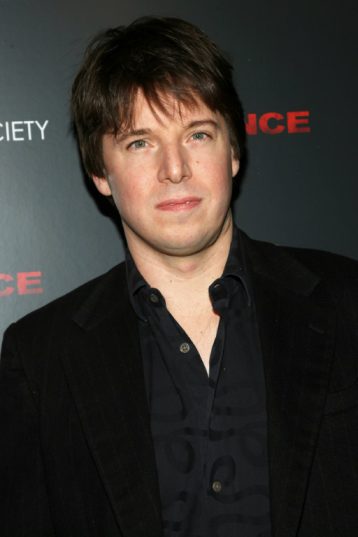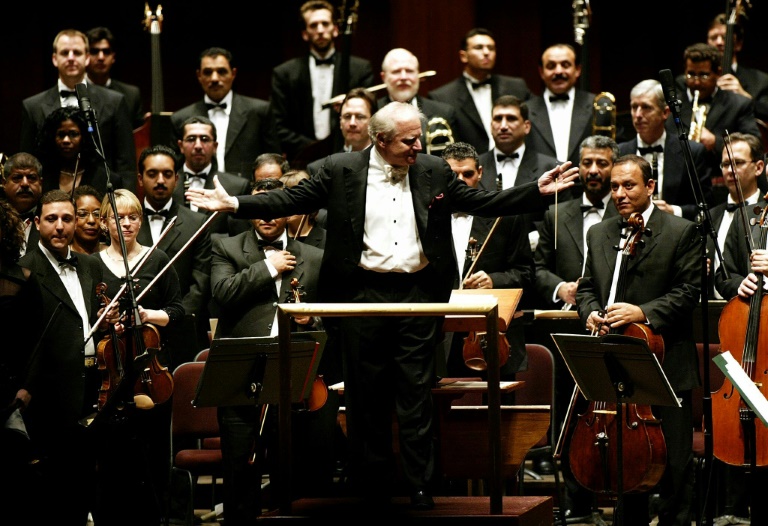Decades after his death, Leonard Bernstein may still be the most identifiable conductor in the public imagination -- dramatic on-stage, bold off-stage and succeeding unlike so many others in making classical music accessible.

But although Bernstein hardly needs rescue from obscurity, the breadth of his work is rarely considered in its totality.
Ahead of next year’s centennial of Bernstein’s birth, the New York Philharmonic — where he was music director from 1958 to 1969 — is putting on a wide-ranging festival that explores Bernstein as a composer, conductor and public figure.
The festival will of course include “West Side Story,” Bernstein’s Broadway musical whose tunes have entered the US popular songbook. But the Philharmonic, bringing in star conductors and soloists, is also showcasing his concert works including all three of his symphonies.
Leading US violinist Joshua Bell, who is performing Bernstein’s philosophical “Serenade (after Plato’s ‘Symposium’),” described Bernstein as a “musical god” who became one of the first American classical musicians to win respect in Europe.
Bernstein as a conductor was “incredibly demonstrative and emotional in a way that hadn’t been seen before, but also very honest and never pretentious,” Bell told AFP.
As a composer as well, “everything was very heart-on-sleeve,” Bell said, noting that Bernstein was especially proud of “Serenade (after Plato’s ‘Symposium’),” which muses on the meaning of love with unusual instrumentation of a dominant violin and diverse percussion.
“I’m second-guessing, but I guess he didn’t want to be known just as a Broadway composer, because he was so much more than that,” Bell said.
– Conductor as public figure –
The festival, which runs through November 14, comes with an exhibition on the persona of Bernstein, who died in 1990.
For many in the 1960s, Massachusetts-born Bernstein became the quintessential New Yorker — and Bernstein used his platform for political advocacy, notably by championing racial equality.
Leonard Slatkin, one of the conductor’s proteges, will lead a number of works including Bernstein’s “Kaddish Symphony,” a meditation based on the Hebrew prayer for the dead, and Richard Strauss’ “Don Quixote” — which then 25-year-old Bernstein conducted on short notice in his exhilarating 1943 debut at the Philharmonic.

Leading US violinist Joshua Bell described Bernstein as a “musical god” who became one of the first American classical musicians to win respect in Europe
Slatkin — who is music director of both the Detroit Symphony Orchestra and the Orchestre National de Lyon — said that for successful American conductors, Bernstein was “our spiritual father.”
Slatkin said Bernstein also broke new ground with his public prominence. As television became universal, Bernstein seized on the small screen and his own fiery personality to bring classical music to a nationwide audience.
“If you watched a video of him conducting and you took the sound out, you would know in five seconds which piece he was conducting,” Slatkin said.
“He had this rare ability to show the music through his gestures and his body language and his face,” he said.
– Marriage of jazz and classical –
Bernstein stands out as a composer for the range of his influences, unafraid of weaving in jazz and popular music even as he remained anchored in the classical world.
Japanese jazz pianist Makoto Ozone will solo on Bernstein’s “Symphony No. 2, ‘The Age of Anxiety'” and also “Rhapsody in Blue,” George Gershwin’s seminal 1924 jazz fusion piece which Bernstein had championed as a conductor.
Ozone said Bernstein was unique among classical composers in understanding jazz rhythms.
“In jazz you’ve got to feel the rhythm, the pulse, that steady internal clock that you have in your body — and then you entrust that groove within your band,” Ozone said.

In the classical world, “I guess Bernstein’s pieces are the only ones that have that element,” Ozone said.
“It’s like Mozart. The melody is so natural and simple but has just enough twist that it makes the whole song so special,” he said. “That’s a sign of universal language.”
Slatkin similarly explained he had considered updating elements of Bernstein’s “Kaddish Symphony,” written against the backdrop of the 1960s — but realized the original work was equally relevant for a new age of turbulence.
If Bernstein were around today, Slatkin has no doubt the conductor would be just as prominent.
“He would be all over the internet, you just know it,” he said with a laugh.
Support Local Journalism
Add The Citizen as a Preferred Source on Google and follow us on Google News to see more of our trusted reporting in Google News and Top Stories.






